How do Civ 7 Ages work? In Civilization 7, the Sid Meier series is renewed with features and mechanics we’ve never seen before. These additions make Civ 7 a more accessible game, while others lean into historical and geographical realism. Ages are perhaps a bit of both, guiding new players through ever-advancing research while challenging veterans with multiple civs.
Civ 7 Legacy Paths are another aspect of this new direction and go hand-in-hand with Ages in Civilization 7. Through each Age: Antiquity, Exploration, and Modern, you have a new series of goals to achieve, whether you’re heading towards a Military, Economic, Science, Culture, or Domination victory. Only by completing enough of these goals can you start the next Age in the strategy game. If that sounds like a lot, we’re here to explain in more detail, so here’s how Civ 7 Ages work.
What are the Civ 7 Ages?
There are three Ages in Civilization 7: the Antiquity Age, the Exploration Age, and the Modern Age. Each Age has its own research topics, buildings, as well as a unique set of civilizations to choose from.
While your choice of Leader sticks with you throughout a whole game, the civilization they rule changes with every Age. When it comes to selecting the best Civ 7 civilizations for each Age, there are some caveats. Each civilization is locked behind certain Leaders, Ages, other civs, or quests. This means that, depending on which civ you pick in the Antiquity Age, you may not be able to play with your favorite civ in the Exploration Age. This is all based on historical and geographical accuracy.
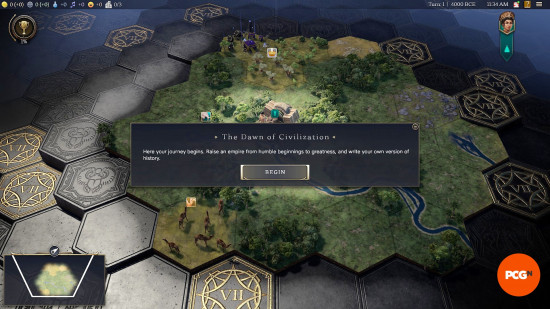
Antiquity Age
You begin the game with a Founder and a small area of land unlocked, with your first decision being where to settle. From here, you can only train a single basic military unit or a Scout, depending on whether defense or exploration is your priority.
The Antiquity Age then takes you through simple expansion, restricting you to the current continent. Research includes early technology like irrigation, the wheel, and basic military training. Even once you’ve researched sailing, your crew is limited to coastal tiles as rough waters damage your simple ships.
When enough progress has been made in the Antiquity Age, determined by the Legacy Points earned by everyone on the map, the Antiquity Age will develop, opening the doors to the Exploration Age.
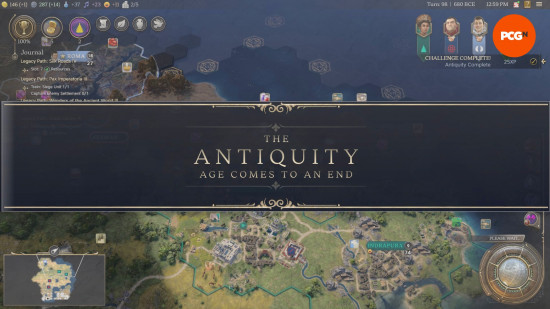
Exploration Age
As you might expect, the Exploration Age is when distant travel can be unlocked. Researching Astronomy and Cartography unlocks new naval units and the ability for some units to enter deep ocean terrain, which means you can go on to study and master shipbuilding, allowing all units to enter deep ocean without taking damage. It’s with this new knowledge and technology that you can settle in distant lands.
Meanwhile, the studies of castles, metallurgy, and machinery add new weaponry and military units to your arsenal, so it’s up to you whether you settle on foreign land or simply take someone else’s distant settlements.
Early in the Exploration Age civic tree, you can also find the Merchant unlockable civilian. Use merchants to create trade routes between yourself and other Leader’s settlements, and build roads for transport between your own cities and towns.
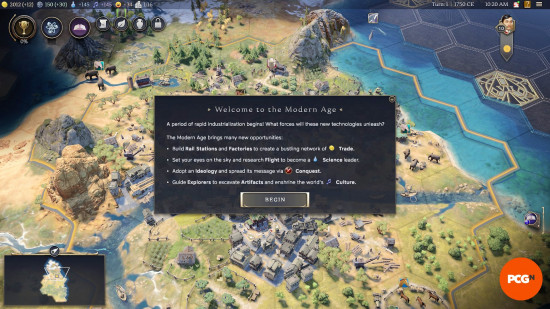
Modern Age
With trade and overseas travel unlocked, it’s time to take things to the rails and the skies in the Modern Age. Start with steam technology and the addition of railroads before moving onto flight – including military air units – and space travel. Tanks and heavy naval units are just some of the new military upgrades at your disposal, while radio gives you a new way to boost happiness.
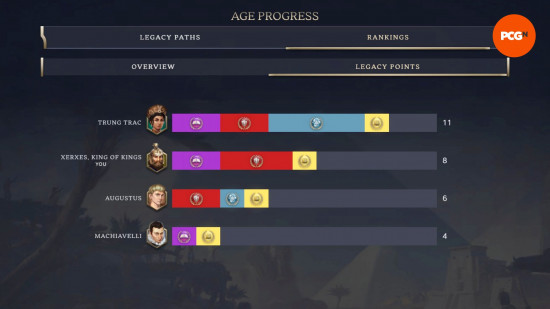
When does a new Civ 7 Age start?
The next Civ 7 Age begins when enough progress has been made by all players collectively. This is determined by Legacy Points, and your progress through the current age can be viewed as a percentage in the top right-hand corner.
Click on the ‘Age Progress’ icon to see a detailed breakdown of your and your opponents’ progress through the current Age via the Rankings tab. The total number of Legacy Points earned across the board relates to the current percentage of Age progress. For example, in the image above, the four players have a total of 29 points, meaning they are 29% of the way through the Age.
Before a new Age begins, you get a warning that there is one final turn, which doesn’t give you long to collect yourself, so it’s important to keep an eye on Age progression. When a new Age begins, your tiles remain the same, your unlocked traditions carry across, and your settlements, Wonders, and Unique Quarters remain. Commanders and some units can also be carried over but turn into the new Age and civ equivalent. Six units can be carried into the Exploration Age, and nine for the Modern Age, with additional units carried over if they’re attached to a Commander.
All cities, except capitals, revert to towns at the start of every new Age, and building bonuses are lost, unless the buildings are Ageless. Old buildings can be overbuilt in the new Age. Uncompleted Legacy quests are also lost. Relationships with other Leaders move towards neutral, and new discoveries, independent powers, and city-states emerge.
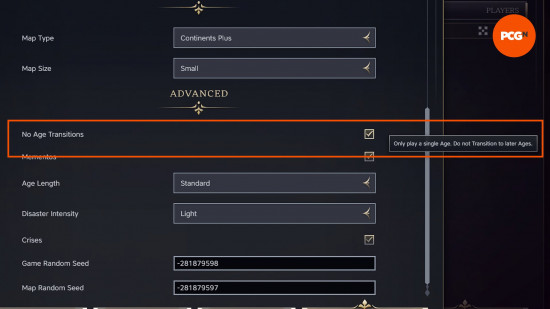
Single-Age games
If you don’t want to play through all three Ages, you can shorten your game to a Single-Age game by turning off Age Transitions in the settings. If you wish to start from the beginning of the Exploration, for example, you’ll already have a capital city with a Palace and industries, as well as some gold, Influence, and other resources. More of the central continent is revealed to you, but you still need to send units out to uncover the majority of the map.
The same goes for the Modern Age, where an even larger part of the map is uncovered, roughly half the continent. More tiles and industries are unlocked in your capital city, and research starts with steam travel and the University, required for training an Explorer and uncovering artifacts. Once more, you start with enough money to get you going, a small amount of Influence, and other resources.
Now you know how the Civ 7 Ages mechanic works in the 4X game, you can start wherever you like in history, whether you want to begin farming on the continent, flying to distant lands, or even launching your people into space. Your chosen preference could direct you toward any one of the Civ 7 victories, but make sure you play as the right Civ 7 Leader to give yourself the best chance at winning.

